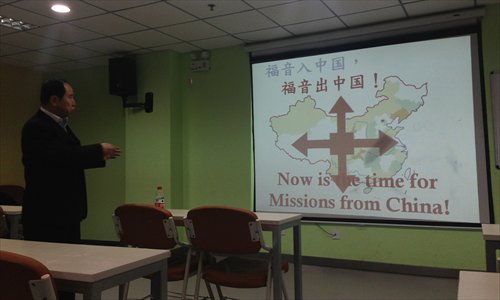Dangerous mission
Chinese missionaries working in Muslim world cause safety concerns

A picture of local church in Central Asia taken by a Chinese missionary Photo: Courtesy of a Beijing church
The past decade has increasingly seen Chinese "house church" congregations send missionaries abroad, some with a focus on evangelization in the Islamic world. The missionaries do their best to adapt, learning the local language, dressing, acting and behaving like the local people. But the work can be risky, as apostasy and blasphemy might be against law in some predominately Muslim countries. Religious experts warn that Chinese Christians' evangelism might cause safety concerns and diplomatic disputes.
Wang Jie (pseudonym), a pastor at Beijing Zion Church, has been on a number of missions to Islamic countries in recent years. He now works on recruiting, training and dispatching Chinese missionaries to Islamic countries.
Wang traveled to Central Asia in 2012 for the first time, leading other six Christians. He has since made short trips to the region several times.
He has now decided that after this year's Spring Festival he and his wife would start their long-term missionary work in the region.
Wang's sending church Beijing Zion Church, established in 2007, has an ambitious vision of spreading the gospel in the Islamic world. To date, the church has dispatched two families to Central Asia. One family has already been there for a year and a half.
While experiencing an expansion in its own country, Chinese Protestant churches say they feel called to spread the gospel.
"In the past 200 years, over 20,000 overseas missionaries preached the gospel to every corner of the nation," Gao Quanfu, head pastor of Light of Zion Church in Xi'an, a pioneer and promoter of Chinese evangelization in Muslim countries, told the Global Times.
Gao said he believes it's time for the Chinese to go out and preach.
China's churches have long been divided between churches officially sanctioned by the government and so-called "house churches," underground churches that do not accept administration from the State.
The Chinese government has adopted a tolerant attitude toward house churches in recent years. House churches' overseas missionary work was spontaneous, with no authorization by Chinese authorities.
There also have doubts on the necessity and impact of the Chinese house churches' overseas evangelism activities.
China's central and local governments do not encourage cross-cultural evangelism, and government-authorized churches have never engaged in such cross-cultural evangelization, Yan Kejia, director of Institute for Religion Research of Shanghai Academy of Social Sciences, told the Global Times.
There are a large number of non-Christians in China, and there has no need to spread religion in foreign countries, Yan added.
Go westward
Before, many Chinese churches struggled to survive due to a shortage of money, staff and resources.
A surging Chinese economy has changed all that. An increasing number of house churches in China now have the means to send overseas missionaries, with Islamic regions as one of mission fields.
Gao believes that Chinese Christians have "natural advantages" when evangelizing in many parts of the world. "Most of the countries in Central and South Asia are friendly to China, which makes it easier for the Chinese Christians to preach the gospel in those nations, compared with the Western missionaries," Gao added.
The missionaries' work is eased by these countries' growing commercial and cultural ties with China. In step with China's growing regional and economic influence, an increasing number of Chinese Christians are moving to Central Asia, Southeast Asia, the Middle East, as well as Africa to set up business and, in some cases, to do missionary work.
Huang Ying (pseudonym) was among the first batch of missionaries sent out by a Beijing house church. She became a Christian in her 20s when she studying in a Beijing university and became determined to be a missionary. Beginning in 2009, she visited Kazakhstan for two weeks to a month every year, teaching Chinese in a language camp for primary school students.
Missionaries are volunteers. They cover living expenses by collecting money from local believers and through remittances by their sending church. Churches typically offer classes on local language, culture and customs before missionaries are sent abroad.
Before Huang started her missionary work, she had to undergo six months of training.
Huang believes he is "answering the call of the Lord" by converting people.
Kazakhstan is a Muslim-majority country, with over 70 percent of the country professing Islam as their faith, according to a 2009 national census.
According to a report by the Daily Mail last November, ISIS released footage showing jihadi training courses for dozens of Kazak children. The video depicted the children being taught to use every type of rifle the organization had available.
Despite the potential risk from extremists, Huang's sending church has made overseas missionary work one of its top priorities since 2009, with special prayer meetings held each Monday. The pastor also updates the congregation on overseas missionary work every Sunday.
Now, at least seven believers in Huang's church are preparing to go to countries including Kyrgyzstan and Kazakhstan. They are undergoing intensive training, and expect to be sent within two years.
Compared with other Asian countries like South Korea, India and the Philippines, China lags behind on overseas missionary work. Among Asian countries, South Korea sent the most missionaries overseas, with 20,000, while China sent only 5,600 in 2010, statistics from Center for the Study of Global Christianity showed.
Risky moves
Evangelizing in Muslim-majority countries can be risky and taxing. Rising extremism has made these countries increasingly unsafe for Christians. Language barriers, cultural differences, and religious conflicts can all wear down the will of Chinese missionaries.
Teaching Chinese to schoolchildren is one possible way of evangelizing, according to pastor Li.
For instance, in some parts of the Muslim countries, Chinese lessons have become compulsory for schoolchildren, the result of ambitious plans to capitalize on the growing influence of China's booming economy.
Joseph Ma, a missionary sent out by Beijing Zion Church, now teaches Chinese at a church school in the region. Zion Church refused to give further information on Joseph's classes for safety reasons.
Growing business ties are another way for missionaries to integrate themselves into new lands and also reduce the financial burden on sending churches.
Pastor Li said if time and finances permit, he would look for possibilities for his church to open a company in the countries where missionaries were sent.
Unaccustomed to the local situation, some missionaries survive in the Islamic regions by establishing relationships with local Christian churches. They also lean on missionaries from other parts of the world to ease the transition to a new culture.
There is no specific figure on how many churches and Chinese missionaries are evangelizing in the Muslim-majority countries.
The Global Times' research found at least 10 churches in Beijing with projects involving missionaries to Kazakhstan, Tajikistan and other Islamic nations.
But most of the churches are still in the preparatory phase, focusing on recruiting and training missionaries.
Most of the churches that have sent missionaries focused on short-term missionary groups led by the church's pastor, as a way of preparing for longer-term missions. "Normally, [the missionaries] stay in the regions for one or two weeks, to get to know the local people, get accustomed to the situation and meet the missionaries who have been there for decades, and to further confirm on their faith and to prepare for the long-term missionary work," a pastor of a Beijing house church who gave his surname as Li told the Global Times.
Churches in East China's Shandong Province have also sent missionaries to Muslim countries, according to Christian Times, an online Christian news provider. Some of them have established connections with local people by helping local people to build houses, a marked improvement over the makeshift straw huts common in many areas of those countries. They also endear themselves to local populations by offering financial support to the poor.
Chinese Christians enter some countries using business visa. The fact that they might be in violation of local laws and the stringent religious situation makes the missionaries reluctant to publicly expose their identities or preach openly.
Pastor Li told the Global Times that his short-term missionary group in one country last year was followed and interrogated by officials in the local civil affairs bureau due to their presence in an area of the country where Chinese visitors are seldom seen.
Growing worries
Experts worry that Chinese Christians in the Islamic world might face safety issues or cause diplomatic disputes when evangelizing in Muslim-majority countries, which could negatively influence bilateral relationships between China and those countries.
"Overseas evangelism should not be spread, as different religious groups should respect [local] religious diversity," Yan told the Global Times.
Each different religious group should demonstrate mutual respect for each other and different cultures, Yan added.
"Every nation has its own culture and traditions which they treasure. This means cross-cultural evangelization can definitely conflict with local people's willingness to preserve their own religious culture. So evangelism should be done in a rational and restrained fashion," Yan told the Global Times.
Meanwhile, cross-cultural evangelism activities should abide by local laws and regulations,.
"As the evangelization was not authorized by the authorities, the churches should shoulder responsibilities when problems occurred." Yan said, citing the example of South Korean cross-cultural evangelism activities.
In 2007, 23 missionaries from South Korea were kidnapped by the Taliban terrorists while evangelizing in Afghanistan, setting off a diplomatic row between the two nations. Fanatical evangelism activities were criticized by South Koreans.
There has worry what might happen if governments in the region come to believe there might be hidden agenda among Chinese businesspeople in the country.
As a result, Chinese church leaders are content to bide their time, waiting patiently for opportunities to present themselves.
"We are not in a hurry. Right now we just want our missionaries to localize. They have to spend years picking up the language, learning the customs and adapting to local society. Afterwards, we might consider preaching the gospel," Wang said.
In some Islamic countries around the world, laws against apostasy and blasphemy remain on the books, according to the Pew Research Center. Conversion from Islam into Christianity in some Islamic countries can be dealt with harshly.
A new Pew Research analysis revealed, as of 2012, 22 percent of the world's countries and territories had anti-blasphemy laws or policies, and 11 percent had laws or policies penalizing apostasy. The legal punishments for such transgressions vary from fines to death.
"Despite some Muslim can felt drawn to the Christianity, it would be difficult for them to openly admit their religion. Conversion the religion might put their lives at risk," Gao said.

A pastor shares his experience in Islamic country in a Beijing church in January. Photo: Liang Chen/GT